Items
Search full-text
“Australia Council releases its first Disability Action Plan”
- The Action Theatre Company
-
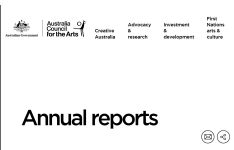 "Australia Council - Annual Reports 2010-2022" Australia Council - Annual Reports 2010-2023
"Australia Council - Annual Reports 2010-2022" Australia Council - Annual Reports 2010-2023 - Magpie State Theatre in Education (TIE) Company
- Regional Arts Australia
-
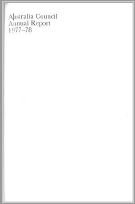 "Australia Council - Annual Report 1977-78" Australia Council Annual Report 1977-78 discusses membership, members of boards, senior staff list, report of Ten Years in the Arts, financial statements, grant lists and programs including funding for arts of deaf children, travel of mime artist to work with deaf artists, salaries of staff, production and presentation costs of Theatre of the deaf staff and production costs for Braille and Talking Book for 1978
"Australia Council - Annual Report 1977-78" Australia Council Annual Report 1977-78 discusses membership, members of boards, senior staff list, report of Ten Years in the Arts, financial statements, grant lists and programs including funding for arts of deaf children, travel of mime artist to work with deaf artists, salaries of staff, production and presentation costs of Theatre of the deaf staff and production costs for Braille and Talking Book for 1978 -
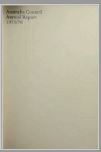 "Australia Council - Annual Report 1975-76" Australia Council Annual Report 1975-76 discusses membership, the year in review, National theatre of the Deaf from New York show and directors development program assisting Theatre of the Deaf, programs including salary and costs for Arts Access (Vic), Salaries, equipment and materials for program of multi-arts activities to Adult Deaf Society, Braille Book of the Year Award and funding program of entertainment for the old, sick and handicapped in homes.
"Australia Council - Annual Report 1975-76" Australia Council Annual Report 1975-76 discusses membership, the year in review, National theatre of the Deaf from New York show and directors development program assisting Theatre of the Deaf, programs including salary and costs for Arts Access (Vic), Salaries, equipment and materials for program of multi-arts activities to Adult Deaf Society, Braille Book of the Year Award and funding program of entertainment for the old, sick and handicapped in homes. -
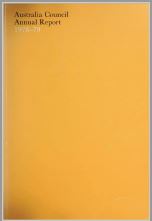 "Australia Council - Annual Report 1978-79" Australia Council Annual Report 1978-79 discusses membership, members of boards, senior staff list, principals and precautions of grants, grant lists, programs including funding for multi arts camps for handicapped children, salaries and travel for NSW and QLD Theatre of the Deaf, and presentation and production costs for Braille and Talking Book Award for 1979.
"Australia Council - Annual Report 1978-79" Australia Council Annual Report 1978-79 discusses membership, members of boards, senior staff list, principals and precautions of grants, grant lists, programs including funding for multi arts camps for handicapped children, salaries and travel for NSW and QLD Theatre of the Deaf, and presentation and production costs for Braille and Talking Book Award for 1979. -
"Declaration on the Rights of Disabled Persons adopted in 1975" The 1960s and 1970s saw major changes in people’s attitudes towards disability. Stemming from the growth of the human rights movement and the introduction of normalisation theory internationally, Australia signed key human rights declarations of people with disabilities, the Declaration on the Rights of Disabled Persons (adopted in 1975). The Declaration argued that disabled people deserve to live lives “as normal and full as possible”.
-
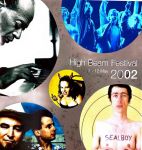 "High Beam Festival Program 2002" High Beam Festival Program 2002 reads "Welcome to High Beam 2002 Australia's international arts and disability festival, celebrating disability culture from around the globe. In our third biennial festival we explore the significance of the circle. In High Beam Festival 2002, that significance is represented through our international program, 'circular' Wheelie BIG Event, the online community of Tech Arts Express and over 40 companies, performers and community members who span the arts and the globe. High Beam is about showing that living with a disability does not exclude you from creating real, exciting, cutting edge art. High Beam is also about showing what it is like to live with a disability through the medium of art. Get out there and enjoy! We are thrilled to present Australia's own legendary pianist David Helfgott, UK comedian Mat Fraser, the amazing wheelchair dancers from Nepal as well as Belinda Mason - Lovering's Intimate Encounters - a landmark photo-graphic exhibition from Australia."
"High Beam Festival Program 2002" High Beam Festival Program 2002 reads "Welcome to High Beam 2002 Australia's international arts and disability festival, celebrating disability culture from around the globe. In our third biennial festival we explore the significance of the circle. In High Beam Festival 2002, that significance is represented through our international program, 'circular' Wheelie BIG Event, the online community of Tech Arts Express and over 40 companies, performers and community members who span the arts and the globe. High Beam is about showing that living with a disability does not exclude you from creating real, exciting, cutting edge art. High Beam is also about showing what it is like to live with a disability through the medium of art. Get out there and enjoy! We are thrilled to present Australia's own legendary pianist David Helfgott, UK comedian Mat Fraser, the amazing wheelchair dancers from Nepal as well as Belinda Mason - Lovering's Intimate Encounters - a landmark photo-graphic exhibition from Australia." - NuunaRon
- Pat Rix
-
“The arts sector is forced to adapt in the face of COVID-19 lockdowns” Government-enforced lockdowns in response to the COVID-19 pandemic saw arts events cancelled and disability arts organisations temporarily close physical premises as social distancing rules came into play. While Coronavirus 19 restricted social contact, there were some benefits that arose such as increased digital access for social connection, online ordering accessible via screen readers and home delivery, virtual tours of art galleries, online choirs, and telehealth appointments.
-
“Queensland Advocacy Incorporated spearhead campaigns to close institutions” In 1989, when the Bjelke-Petersen-Ahern Government was coming to an end, the newly established Queensland Advocacy Incorporated was spearheading campaigns around the state to close down institutions and provide financing for individual help for individuals with disabilities.
-
“Accessible Arts (NSW) established” Accessible Arts (NSW) was established in 1986. "the peak arts and disability organisation in New South Wales. We advance the rights of, and opportunities for, people with disability or who are d/Deaf to develop and sustain professional careers in the arts and have equitable access to arts and culture across NSW".
-
“Advocates fight for accessible public transport” In 1994, Maurice Corcoran (a wheelchair user) lodged a complaint about the South Australian government ordering 50 new buses that were not accessible. The Australian Human Rights Commission successfully negotiated for all new buses to be fitted with ramps. Then, in 1999, a protest about the lack of public transport options for people with disability saw Citizens for Accessible Public Transport block traffic in Sydney’s city centre.
-
“Studio A established in 2000” Studio A (NSW) was established in 2000 to create access and opportunities for visual artists with intellectual disabilities; their in-house artists’ “practices range from painting and drawing to sculpture, textiles and digital media”. In their own words, “At Studio A, we are dedicated to professionally empower artists with disability and have their voices heard within contemporary Australian culture.”
-
“Sit Down Shutup and Watch, a screen festival for people with learning disabilities, is launched in 2014” In 2014, Tutti Arts launched Sit Down Shutup and Watch (SDSW). SDSW is a collective led by people with learning disabilities; They present a biennial international screen festival which features the work of disabled creators. The committee also hosts workshops and online resources.
- Helen Connor
-
“The 2010s sees numerous new disability performing arts companies established” The 2010s saw the establishment of several new disability performing arts companies and collectives, both professional and community-based, across the country: Beyond the Square (NSW, 2011), ‘stArts with a D’ Performance Ensemble (NT, 2011), Theatre on Wheels (VIC, 2011), Can You See Me? Theatre (NSW, 2012), Company AT (SA, 2012), Sprung!! Integrated Dance Theatre (NSW, 2013), Screech Arts (QLD, 2014), IndelibilityArts (QLD, 2015), AHA Ensemble (QLD, 2015), Murmuration (NSW, 2015), Raspberry Ripple (VIC, 2015), Deafferent Theatre (VIC, 2016).
-
“Disabled actor and writer Heather Rose stars in ‘Dance Me to My Song’ (1998)” The 1998 film ‘Dance Me to My Song’ stars Heather Rose, who also co-wrote the film. It is about a woman with cerebral palsy, whose carer resents the job. The dramatic tension rises when the two women both take an interest in the same man. The Rolf de Heer-directed film is significant for casting a disabled actor at a time when authentic disability representation was rare, not to mention Rose’s contribution to the screenplay. ‘Dance Me to My Song’ was selected to feature in the Cannes International Film Festival in May 1998. The documentary ‘Heather Rose Goes to Cannes’ (1998, Christopher Corin) follows Rose’s journey from Adelaide to Cannes.
-
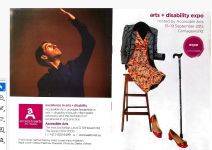 "Accessible Arts - Arts and Disability Expo - Program" Accessible Arts - Arts and DIsability Expo 2015 - Program - reads, in part "'Welcome to the first arts + disability expo. The arts + disability expo aims to provide you with information, advice and access to arts and cultural opportunities. With a variety of arts programs, organisations, venues and practitioners on hand, we hope to provide you with all the support that you need to become involved in creative pursuits. We encourage you to watch some of the performances, listen to the talks about the National Disability Insurance Scheme (NDIS), and view the photographic exhibition. The expo is also a good opportunity to see new and different levels of creative work by artists with disability.' - Sancha Donald, CEO, Accessible Arts"
"Accessible Arts - Arts and Disability Expo - Program" Accessible Arts - Arts and DIsability Expo 2015 - Program - reads, in part "'Welcome to the first arts + disability expo. The arts + disability expo aims to provide you with information, advice and access to arts and cultural opportunities. With a variety of arts programs, organisations, venues and practitioners on hand, we hope to provide you with all the support that you need to become involved in creative pursuits. We encourage you to watch some of the performances, listen to the talks about the National Disability Insurance Scheme (NDIS), and view the photographic exhibition. The expo is also a good opportunity to see new and different levels of creative work by artists with disability.' - Sancha Donald, CEO, Accessible Arts" - Tim Williams
- Timothy Charles Williams
- Sally Shrimpton
- Samraing Chea
